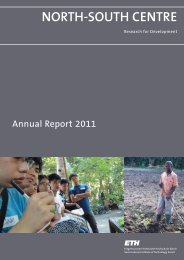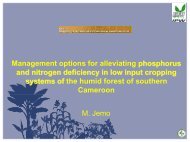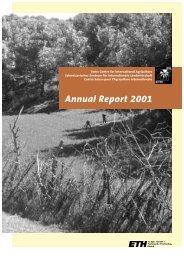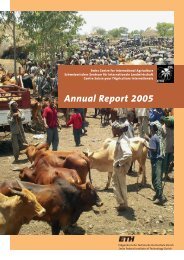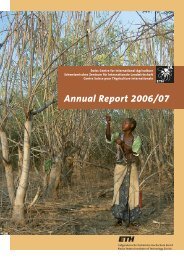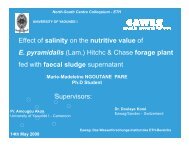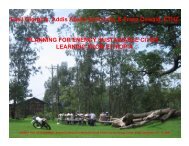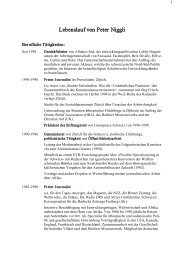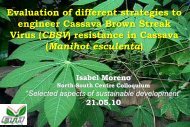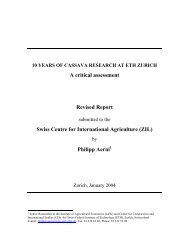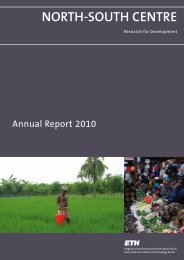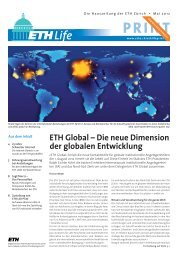NORTH-SOUTH CENTRE - ETH - North-South Centre North-South ...
NORTH-SOUTH CENTRE - ETH - North-South Centre North-South ...
NORTH-SOUTH CENTRE - ETH - North-South Centre North-South ...
You also want an ePaper? Increase the reach of your titles
YUMPU automatically turns print PDFs into web optimized ePapers that Google loves.
The role of cooperativeness in adopting<br />
sustainable common resource management<br />
This research takes place in the context of an environmental<br />
programme (EP) targeting fishermen living in a natural<br />
reserve in Brazil. In this natural reserve, one of the most<br />
important income sources, fishing, is threatened by overfishing.<br />
In addition to catching fish, many fishermen have<br />
started to catch shrimp. This has led to the decline of the<br />
shrimp population because fishermen use traps which<br />
capture large amounts of not yet fertile shrimp. The main<br />
objective of this project is (i) to better understand the roles<br />
of cooperative and less cooperative fishermen in introducing<br />
a new policy for the management of shrimp resources,<br />
and (ii) to help policy-makers to design suitable institutions<br />
in this regard.<br />
In 2008, fieldwork was conducted with 143 fishermen. It<br />
included replacing some of the current traps, and manufacturing<br />
less exploitative shrimp traps. Additionally, the<br />
fishermen were asked to (i) participate in laboratory experiments,<br />
(ii) vote on participation/non-participation in the<br />
programme, and (iii) take part in a survey in which we asked<br />
questions on their social networks, perceptions and beliefs.<br />
This unique sequence of measures with the same individuals<br />
will help us to understand the role of experimentallyobserved<br />
cooperative behaviour in the adoption of a sustainable<br />
policy.<br />
One of our findings shows that fishermen who are wellintegrated<br />
in the social network of their community, and<br />
fishermen who participated in the development of the EP<br />
cooperate more during the programme than others. In addition,<br />
we find that the perception of the necessity of this<br />
EP plays an important role for cooperation during the programme.<br />
Furthermore, we find no evidence that individuals<br />
are more likely to be friends with individuals who share<br />
similar economic preferences than with others. On the<br />
contrary, our findings suggest that opposites attract when<br />
it comes to risk and time preferences. In addition, our results<br />
also show that risk and competition preferences are<br />
related to the centrality in the network: Individuals who are<br />
more central in the network are more likely to take risks and<br />
compete more than individuals at the periphery. Social preferences<br />
are not significantly related to network structure<br />
and network centrality.<br />
These results provide empirical evidence for the role of<br />
social integration, participation, and perceptions for community<br />
resource management. Our findings may also be<br />
useful for the interpretation of relationships between social<br />
network characteristics and economic behaviours.<br />
Research fellow<br />
Carina Cavalcanti, <strong>ETH</strong> Zurich, Switzerland<br />
73<br />
Supervisor<br />
Stefanie Engel, <strong>ETH</strong> Zurich, Switzerland<br />
Collaborators<br />
Ernst Fehr, University of Zurich, Switzerland;<br />
Randall E. Brummett, World Fish Center, Cameroon;<br />
Elinor Ostrom, Indiana University, USA;<br />
Jose Augusto Tosato, Secretaria do Meio Ambiente<br />
e Recursos Hidricos, Brazil;<br />
Luciano Vaz,<br />
Universidade Estadual de Feira de Santana, Brazil;<br />
Marcelo Raseira, ProVárzea – IBAMA, Manaus, Brazil<br />
Duration<br />
May 2008 – April 2010<br />
Capacity development<br />
Research fellowships<br />
A Brazilian fisherman with his new, less exploitative shrimp trap




